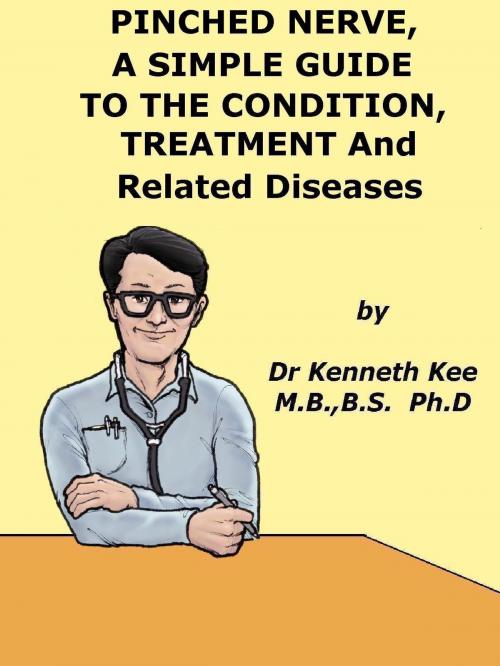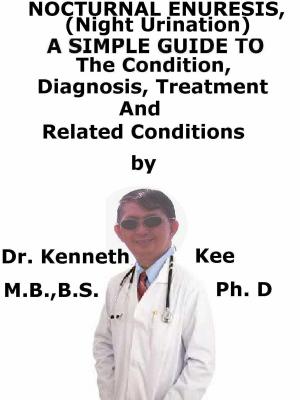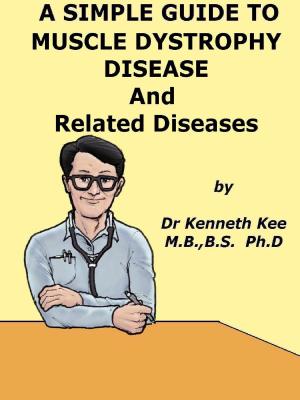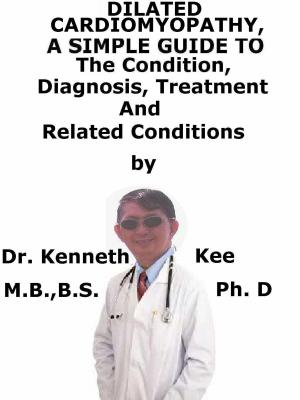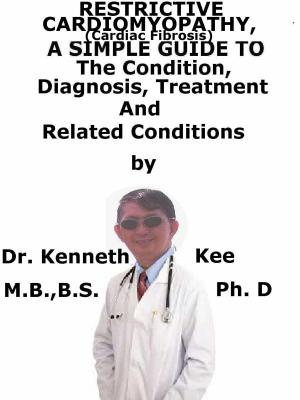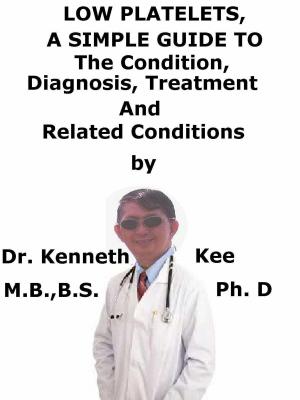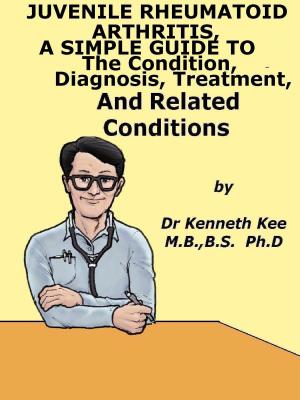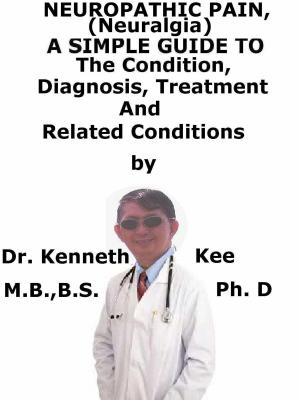Pinched Nerve, A Simple Guide to the Condition, Treatment and Related Diseases
Nonfiction, Health & Well Being, Health, Ailments & Diseases, Nervous System & the Brain, Medical, Specialties, Internal Medicine, Neurology| Author: | Kenneth Kee | ISBN: | 9781310182235 |
| Publisher: | Kenneth Kee | Publication: | December 11, 2014 |
| Imprint: | Smashwords Edition | Language: | English |
| Author: | Kenneth Kee |
| ISBN: | 9781310182235 |
| Publisher: | Kenneth Kee |
| Publication: | December 11, 2014 |
| Imprint: | Smashwords Edition |
| Language: | English |
A pinched nerve occurs when a nerve is pressed on
By other surrounding tissues such as muscles and bone
This can result in nerve pain, tingling and numbness
Difficulty controlling specific muscles or weakness.
The nerve injury may result from compression, constriction
From a bone spur or overstretched muscle tension
Sharp or burning pain which may radiate outward.
Sometimes coughing or sneezing causes the pain downward
Treatment is by rest of the affected nerve
Exercising can strengthen the muscles the nerve serves
Analgesics such as brufen will relieve the pain
Corticosteroid injections help to relieve the inflamed
Surgery is the last resort to release pressure on the pinched nerve
By removing the spurs or cutting the ligaments of the tight carpal tunnel
A inter-vertebral disk is excised whole or part by part
And replaced with a bone graft or metal disk is inserted
-An original poem by Kenneth Kee
Interesting Tips about the Pinched Nerve
A Healthy Lifestyle
1. Take a well Balanced Diet
2. The only treatment for a cataract is surgery to remove it.
The development of cataracts is unpredictable.
Some cataracts remain less dense and never progress to the point where they cause cloudy vision and require treatment, while others progress more quickly.
Thus the decision and timing to proceed with cataract surgery is individualized for each patient.
The doctor will be able to tell you how much of your vision loss is due to cataracts and the type of visual recovery that may be expected if surgery is chosen.
Surgery is done if you cannot perform normal activities such as driving, reading or looking at computer or video screens even with glasses.
Cataracts usually do not harm your eye so you can have surgery when it is convenient for you.
However some people may have additional eye problems such as diabetic retinopathy that cannot be treated without first having cataract surgery.
3. Keep bones and body strong
Bone marrow produces our blood
Eat foods rich in calcium like yogurt, cheese, milk, and dark green vegetables.
Eat foods rich in Vitamin D, like eggs, fatty fish, cereal, and fortified milk.
Eat food rich in Vitamins B and C such as green vegetables and fruits
Zinc and other minerals are important to the body
4. Get enough rest and Sleep
Avoid stress and tension
5. Exercise and stay active.
It is best to do weight-bearing exercise such as walking, jogging, stair climbing, dancing, or lifting weights for 2½ hours a week.
One way to do this is to be active 30 minutes a day at least 5 days a week.
Begin slowly especially if a person has not been active.
6. Do not drink more than 2 alcohol drinks a day for a man or 1 alcohol drink a day for a woman.
Alcohol use also increases the chance of falling and breaking a bone.
Alcohol can affect the neurons and brain cells.
7. Stop or do not begin smoking.
It also interferes with blood supply and healing.
Chapter 1
Pinched Nerve
A pinched nerve occurs when there is too much pressure applied to a nerve by other surrounding tissues such as bones, muscles or tendons.
This pressure affects the nerve's function causing pain, tingling, numbness or weakness.
A pinched nerve can occur anywhere in the body.
As an example, a herniated disk in the lumbar spine may press on a nerve root causing severe pain that radiates down the back of the leg (sciatica).
Similarly a pinched nerve in the wrist can lead to pain and numbness in the hand and fingers (carpal tunnel syndrome).
TABLE OF CONTENT
Introduction
Chapter 1 Pinched Nerve
Chapter 2 Interesting Facts of Pinched Nerve
Chapter 3 Treatment of Pinched Nerve
Chapter 4 Sciatica
Chapter 5 Carpal Tunnel Syndrome
Chapter 6 Spinal Cord Injury
Chapter 7 Cauda Equina Syndrome
A pinched nerve occurs when a nerve is pressed on
By other surrounding tissues such as muscles and bone
This can result in nerve pain, tingling and numbness
Difficulty controlling specific muscles or weakness.
The nerve injury may result from compression, constriction
From a bone spur or overstretched muscle tension
Sharp or burning pain which may radiate outward.
Sometimes coughing or sneezing causes the pain downward
Treatment is by rest of the affected nerve
Exercising can strengthen the muscles the nerve serves
Analgesics such as brufen will relieve the pain
Corticosteroid injections help to relieve the inflamed
Surgery is the last resort to release pressure on the pinched nerve
By removing the spurs or cutting the ligaments of the tight carpal tunnel
A inter-vertebral disk is excised whole or part by part
And replaced with a bone graft or metal disk is inserted
-An original poem by Kenneth Kee
Interesting Tips about the Pinched Nerve
A Healthy Lifestyle
1. Take a well Balanced Diet
2. The only treatment for a cataract is surgery to remove it.
The development of cataracts is unpredictable.
Some cataracts remain less dense and never progress to the point where they cause cloudy vision and require treatment, while others progress more quickly.
Thus the decision and timing to proceed with cataract surgery is individualized for each patient.
The doctor will be able to tell you how much of your vision loss is due to cataracts and the type of visual recovery that may be expected if surgery is chosen.
Surgery is done if you cannot perform normal activities such as driving, reading or looking at computer or video screens even with glasses.
Cataracts usually do not harm your eye so you can have surgery when it is convenient for you.
However some people may have additional eye problems such as diabetic retinopathy that cannot be treated without first having cataract surgery.
3. Keep bones and body strong
Bone marrow produces our blood
Eat foods rich in calcium like yogurt, cheese, milk, and dark green vegetables.
Eat foods rich in Vitamin D, like eggs, fatty fish, cereal, and fortified milk.
Eat food rich in Vitamins B and C such as green vegetables and fruits
Zinc and other minerals are important to the body
4. Get enough rest and Sleep
Avoid stress and tension
5. Exercise and stay active.
It is best to do weight-bearing exercise such as walking, jogging, stair climbing, dancing, or lifting weights for 2½ hours a week.
One way to do this is to be active 30 minutes a day at least 5 days a week.
Begin slowly especially if a person has not been active.
6. Do not drink more than 2 alcohol drinks a day for a man or 1 alcohol drink a day for a woman.
Alcohol use also increases the chance of falling and breaking a bone.
Alcohol can affect the neurons and brain cells.
7. Stop or do not begin smoking.
It also interferes with blood supply and healing.
Chapter 1
Pinched Nerve
A pinched nerve occurs when there is too much pressure applied to a nerve by other surrounding tissues such as bones, muscles or tendons.
This pressure affects the nerve's function causing pain, tingling, numbness or weakness.
A pinched nerve can occur anywhere in the body.
As an example, a herniated disk in the lumbar spine may press on a nerve root causing severe pain that radiates down the back of the leg (sciatica).
Similarly a pinched nerve in the wrist can lead to pain and numbness in the hand and fingers (carpal tunnel syndrome).
TABLE OF CONTENT
Introduction
Chapter 1 Pinched Nerve
Chapter 2 Interesting Facts of Pinched Nerve
Chapter 3 Treatment of Pinched Nerve
Chapter 4 Sciatica
Chapter 5 Carpal Tunnel Syndrome
Chapter 6 Spinal Cord Injury
Chapter 7 Cauda Equina Syndrome
